Oatmeal is one of the most nutritious and heart-friendly breakfast options you can eat. It’s rich in soluble fiber, antioxidants, and essential nutrients that support heart, gut, and metabolic health.
Understanding oatmeal’s benefits helps you make better choices for overall wellness, from improved digestion to balanced energy levels throughout the day.
Oats are naturally gluten-free (though sometimes processed in facilities that handle wheat), making them a versatile and wholesome choice for most diets. Whether eaten as a warm breakfast, overnight oats, or smoothie addition, oatmeal supports sustainable energy, cholesterol balance, and digestive comfort.
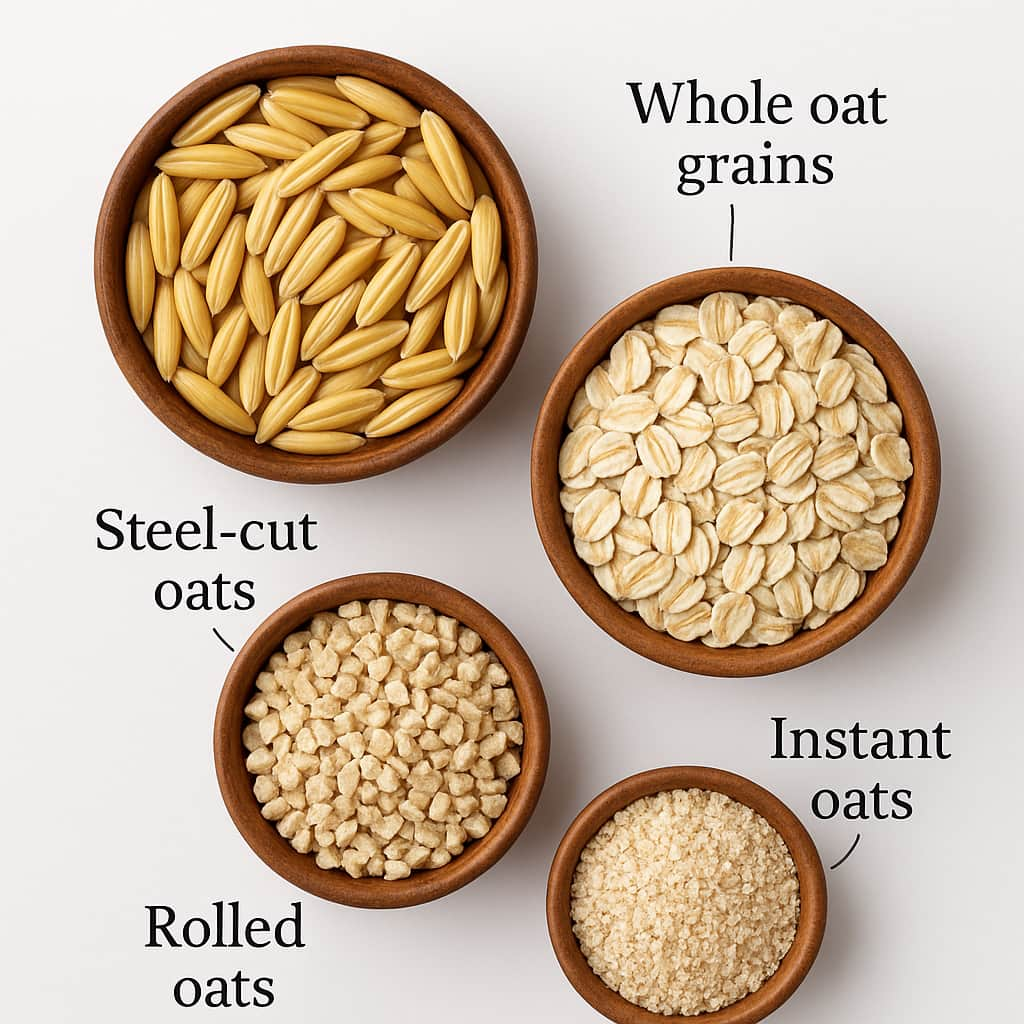
What Is Oatmeal?
Oatmeal is made from whole oats (Avena sativa) — a whole grain rich in complex carbohydrates, plant-based protein, and dietary fiber.
Common forms include:
- Steel-cut oats: minimally processed; chewy texture and low glycemic index.
- Rolled oats: steamed and flattened; ideal for porridge or baking.
- Instant oats: pre-cooked and thinly rolled; cook quickly but digest faster.
Choosing less processed oats helps retain more nutrients and fiber for better health benefits.
Nutritional Profile of Oatmeal (Per 100g, Cooked)
| Nutrient | Amount | % Daily Value* |
|---|---|---|
| Calories | 68 kcal | — |
| Carbohydrates | 12 g | 4% |
| Protein | 2.4 g | 5% |
| Total Fat | 1.4 g | 2% |
| Fiber (Total) | 1.7 g | 6% |
| Manganese | 0.6 mg | 30% |
| Magnesium | 27 mg | 7% |
| Phosphorus | 77 mg | 11% |
| Iron | 0.6 mg | 3% |
| Zinc | 0.6 mg | 5% |
| Vitamin B1 (Thiamin) | 0.1 mg | 8% |
*Source: USDA FoodData Central, 2024
10 Proven Health Benefits of Oatmeal (Backed by Science)
Oatmeal is a nutrient-dense whole grain linked to better heart, metabolic, and digestive health. Decades of research confirm that regular oat consumption supports cholesterol control, blood-sugar balance, and long-term wellness — making it one of the most evidence-backed breakfast choices available today.
1. Supports Heart Health and Cholesterol Balance
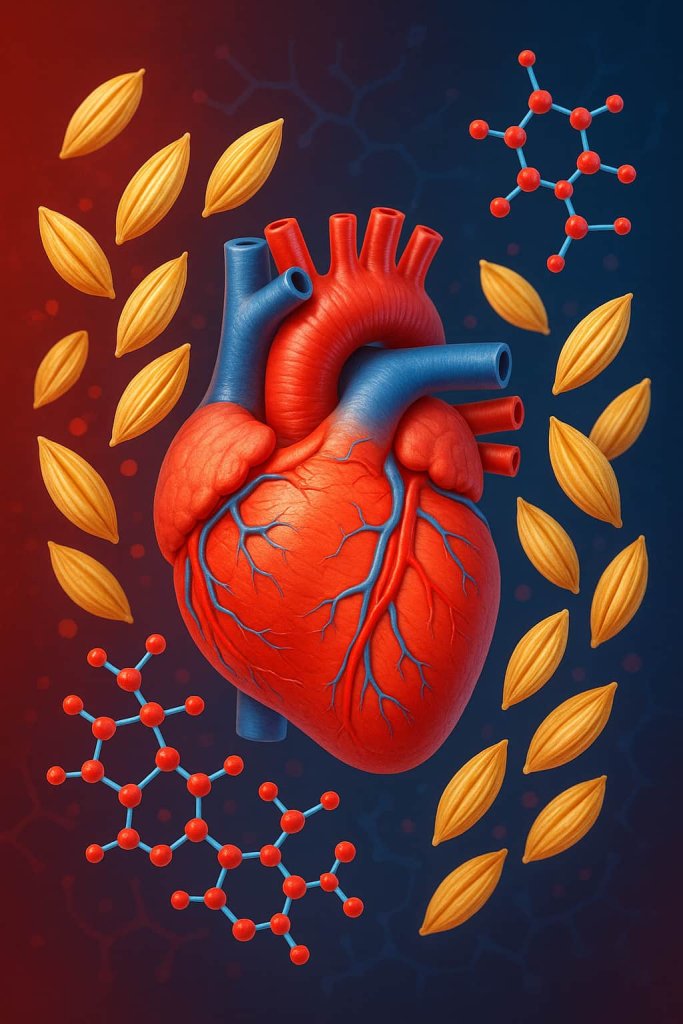
Oatmeal is rich in beta-glucan, a soluble fiber that forms a gel-like substance in the digestive tract. This fiber binds cholesterol-rich bile acids and helps remove them from the body, potentially lowering total and LDL (“bad”) cholesterol levels without affecting healthy HDL cholesterol.
A 2021 systematic review in The American Journal of Clinical Nutrition found that daily beta-glucan intake (3 g or more) from oats may reduce LDL cholesterol by 5–7%, helping support overall cardiovascular wellness.
Harvard researchers also emphasize that oats may aid in reducing the risk of coronary heart disease when consumed as part of a diet low in saturated fat and cholesterol (Harvard T.H. Chan School of Public Health).
References:
- Harvard T.H. Chan School of Public Health – Oats and Heart Health
- The American Journal of Clinical Nutrition (2021)
2. Helps Regulate Blood Sugar Levels
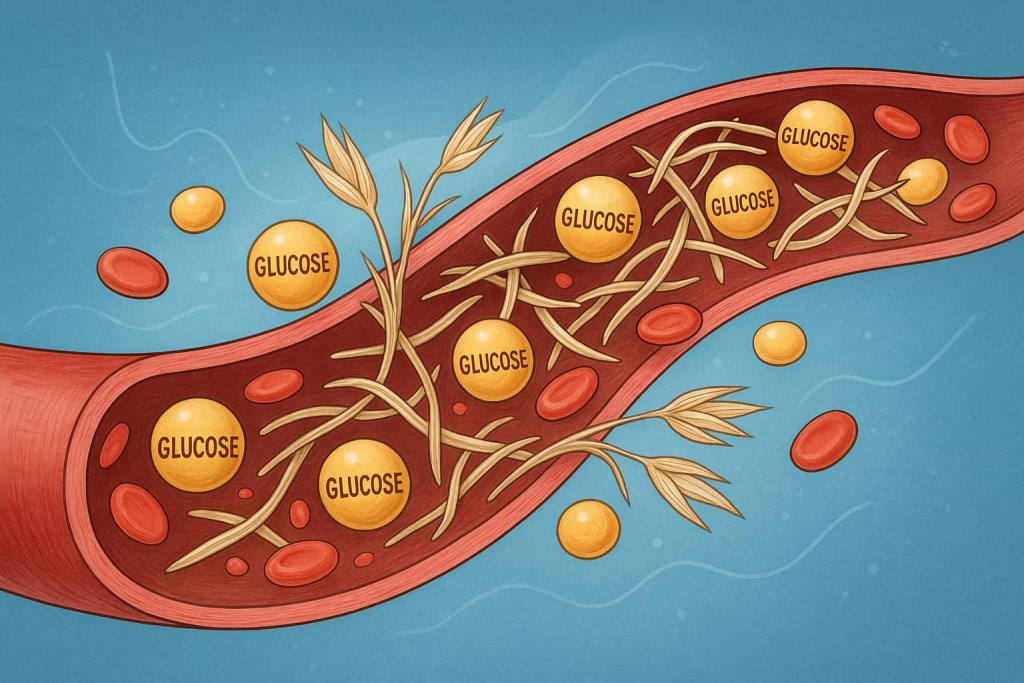
Oatmeal’s soluble fiber—particularly beta-glucan—plays a key role in moderating post-meal blood sugar responses. This fiber forms a viscous gel in the digestive tract, slowing down carbohydrate breakdown and glucose absorption. As a result, oatmeal may help prevent sharp spikes in blood glucose and insulin levels, supporting balanced energy and metabolic health.
A 2019 randomized controlled trial published in the British Journal of Nutrition found that less-processed oat varieties such as steel-cut and old-fashioned rolled oats produced a significantly lower glycemic and insulinemic response compared to instant oats. These slower-digesting forms help maintain steadier glucose levels throughout the day — an important factor for individuals managing type 2 diabetes or metabolic syndrome (British Journal of Nutrition, Cambridge University Press, 2019).
For optimal results, choose steel-cut or rolled oats instead of instant varieties, and pair them with healthy fats or protein (such as nuts, seeds, or yogurt) to further stabilize blood sugar levels and improve satiety.
References:
- British Journal of Nutrition – Impact of Oat Processing on Glycemic and Insulinemic Responses (2019)
- Frontiers in Nutrition – Beta-Glucan and Glucose Regulation (2022)
3. Promotes Digestive Health

Oats are a valuable source of soluble and insoluble fibers, both of which play key roles in maintaining digestive comfort.
Soluble fiber (beta-glucan) helps soften stool consistency, while insoluble fiber adds bulk, supporting bowel regularity.
A 2023 paper in Nutrients highlighted that oat beta-glucan acts as a prebiotic, feeding beneficial gut bacteria that may help maintain a balanced gut microbiome. This supports nutrient absorption and may reduce occasional bloating or discomfort.
References:
4. May Support Weight Management

Oatmeal’s high fiber and nutrient density make it a powerful ally for healthy weight management. The soluble fiber beta-glucan absorbs water and expands in the stomach, which may help promote satiety — the feeling of fullness that reduces overeating and supports balanced calorie intake throughout the day.
According to the Harvard T.H. Chan School of Public Health, beta-glucan in oats can slow gastric emptying and stimulate appetite-regulating hormones such as peptide YY (PYY) and cholecystokinin (CCK). These hormones play a role in controlling hunger and promoting satisfaction after meals. This mechanism helps maintain energy balance and may contribute to gradual, sustainable weight management when combined with an overall balanced diet and regular physical activity.
For best results, opt for steel-cut or rolled oats instead of flavored instant versions, which can be high in added sugar. Pair oatmeal with protein- or antioxidant-rich toppings like Greek yogurt, nuts, chia seeds, or berries to enhance nutritional value and maintain steady energy levels.
References:
- Harvard T.H. Chan School of Public Health – Oats and Weight Control
- WebMD – Health Benefits of Oatmeal
- Healthline – Science-Based Benefits of Oats
5. Rich in Antioxidants and Anti-Inflammatory Compounds
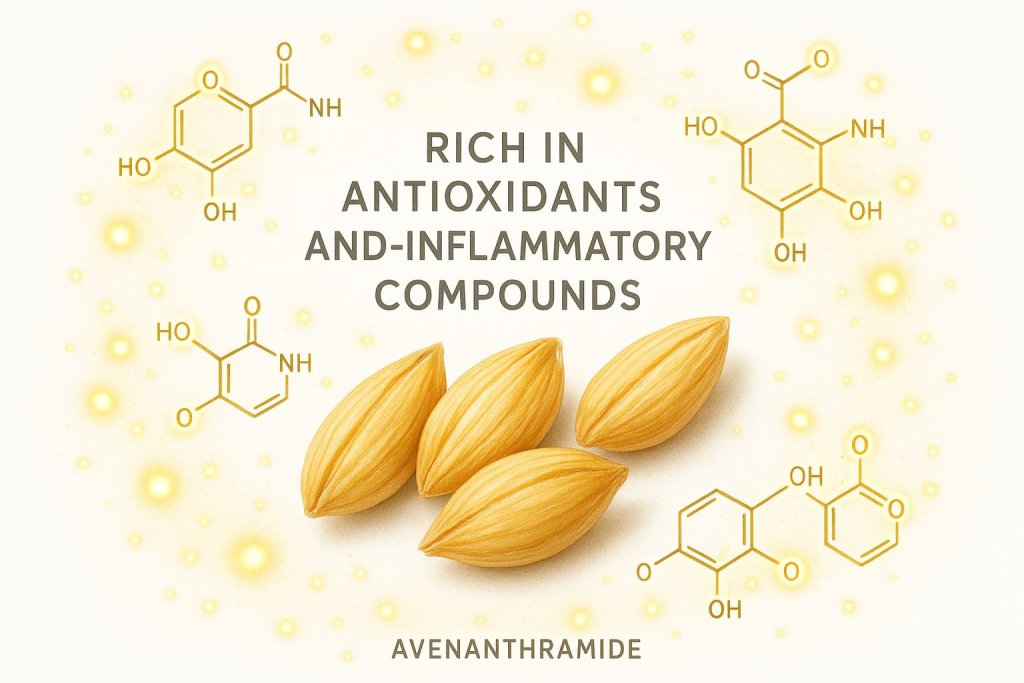
Oats contain avenanthramides, unique polyphenol antioxidants found almost exclusively in oats.
These compounds may help support vascular health by increasing nitric oxide production, relaxing blood vessels, and reducing oxidative stress that contributes to inflammation.
Research published in Food Chemistry and PubMed Central shows that avenanthramides may also have protective effects against cellular damage from free radicals. This antioxidant activity supports long-term cardiovascular and metabolic function.
References:
6. Supports Healthy Gut Microbiome
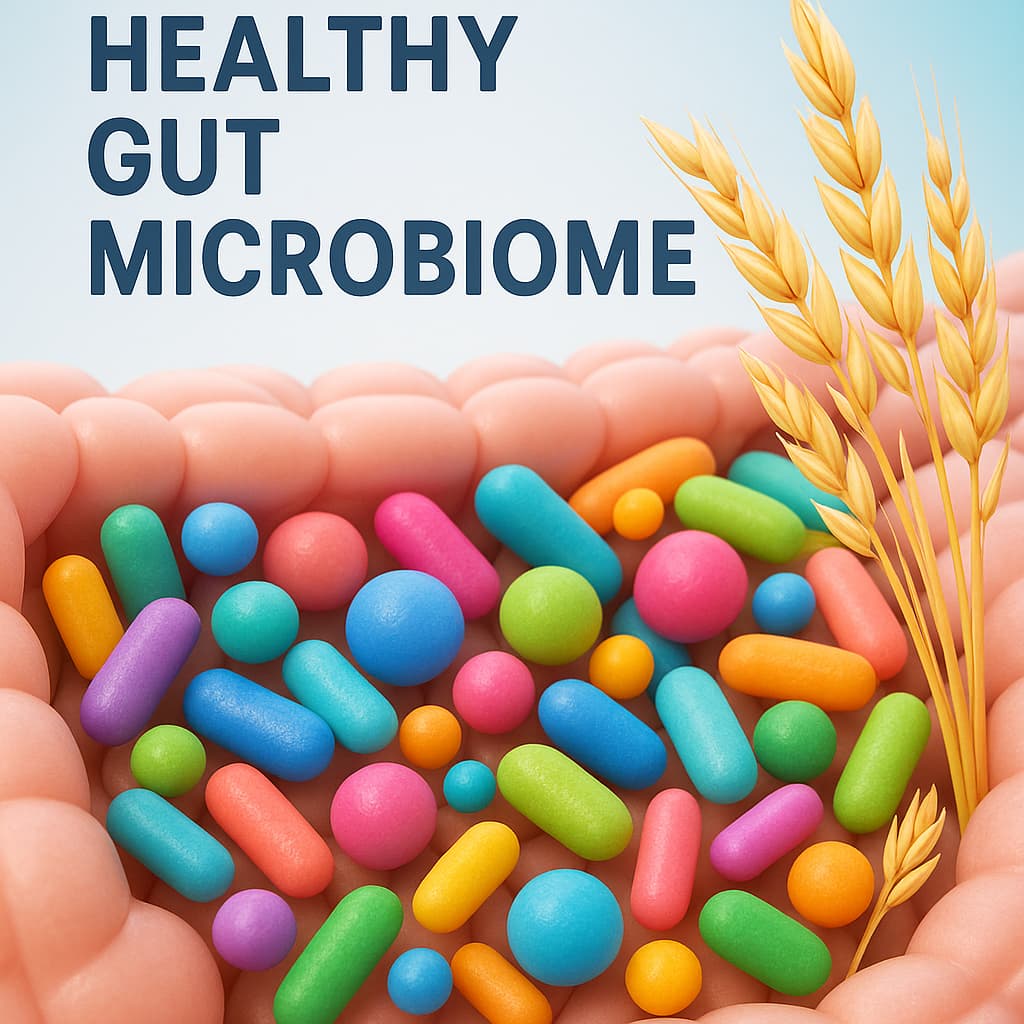
Regular oat consumption fosters a healthy balance of beneficial gut bacteria such as Bifidobacteria and Lactobacilli.
These microbes help strengthen the intestinal barrier, support immune regulation, and may reduce inflammation markers in the body.
A 2022 review in Nutrients found that oat-derived beta-glucan fermentation leads to the production of short-chain fatty acids (SCFAs) like butyrate, which nourish colon cells and support overall gut health.
References:
7. Helps Maintain Steady Energy Levels

Oatmeal provides complex carbohydrates and soluble fiber that digest slowly, resulting in a steady and sustained release of glucose into the bloodstream. This gradual energy supply helps prevent sudden spikes and crashes in blood sugar — making oatmeal an excellent choice for athletes, students, and professionals who need long-lasting fuel for focus and endurance.
According to the Harvard Health Publishing, whole grains like oats have a low glycemic index, meaning they release energy slowly and steadily rather than causing sharp fluctuations in blood glucose. This property helps maintain stable energy levels and supports better concentration and performance throughout the day.
For optimal energy balance, combine oatmeal with healthy fats (such as almond butter or flaxseeds) and protein sources (like milk, yogurt, or nuts). This balanced macronutrient combination helps further stabilize blood sugar levels, improve satiety, and sustain energy over time.
References:
- Harvard Health Publishing – Sizing Up “Superfoods” for Heart Health (Including Oats)
- Harvard T.H. Chan School of Public Health – Oats and Whole Grains Overview
8. May Support Skin Health

Oatmeal is widely valued not only as a nutritious food but also as a soothing, skin-supportive ingredient. In skincare, colloidal oatmeal—a finely ground form of whole oats—is the key therapeutic material. It contains beneficial compounds such as beta-glucans, phenolic antioxidants (including avenanthramides), and lipids that help maintain a healthy skin barrier.
Colloidal oatmeal is officially recognized by the U.S. Food and Drug Administration (FDA) as a skin protectant active ingredient under the Over-The-Counter (OTC) Drug Monograph for Skin Protectant Drug Products. According to the FDA’s latest monograph documentation (OTC Monograph M016), colloidal oatmeal may help retain moisture, reduce minor irritation, and support skin comfort—especially for dry, sensitive, or easily irritated skin types.
These protective effects come from colloidal oatmeal’s ability to form a breathable barrier on the skin, helping minimize water loss while calming irritation from dryness or environmental factors.
Oat-based skincare products such as creams, cleansers, bath treatments, and lotions are often recommended for individuals with sensitive skin or temporary irritation. When used regularly, they may help maintain a balanced, hydrated, and resilient skin barrier, contributing to overall skin wellness.
References:
- FDA – OTC Monograph M016: Skin Protectant Drug Products for OTC Human Use
- Cleveland Clinic – Colloidal Oatmeal: Skin Benefits
9. Supports Immune Function
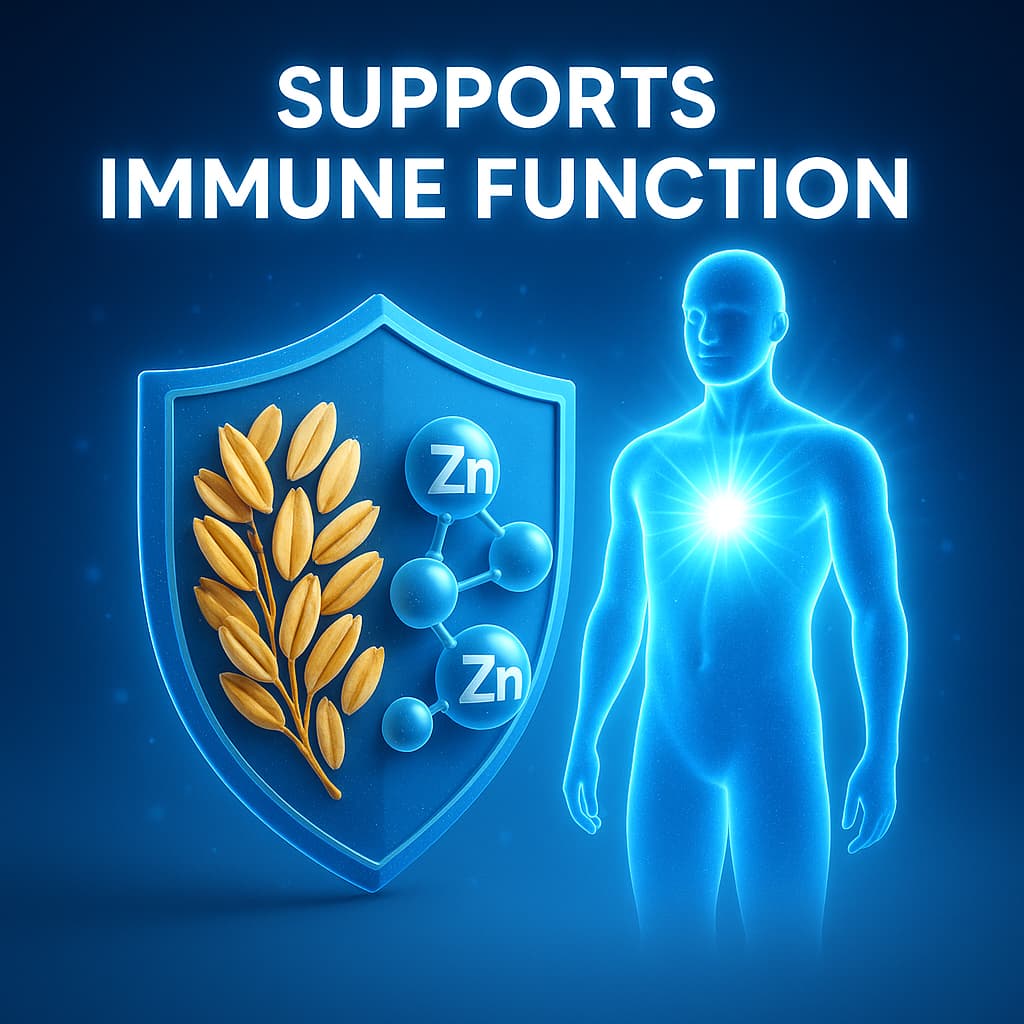
Oats contain immune-supportive nutrients such as zinc, selenium, and beta-glucan, which may help maintain the body’s natural defense mechanisms.
Research from the National Institutes of Health (NIH) notes that these nutrients contribute to immune cell activation and oxidative stress regulation.
Animal studies have also suggested that beta-glucan supplementation may enhance the function of macrophages and natural killer (NK) cells, promoting balanced immune readiness — though human data remain limited.
References:
10. May Contribute to Longevity and Overall Wellness

Long-term studies consistently show that whole grains like oats are linked to lower risks of heart disease, stroke, obesity, and type 2 diabetes.
A landmark 2015 cohort study published in JAMA Internal Medicine reported that individuals consuming higher amounts of whole grains had significantly lower all-cause and cardiovascular mortality rates.
Oatmeal’s unique combination of fiber, antioxidants, vitamins, and minerals makes it a valuable part of a balanced diet that supports lifelong wellness and vitality.
References:
How to Eat Oatmeal for Best Results
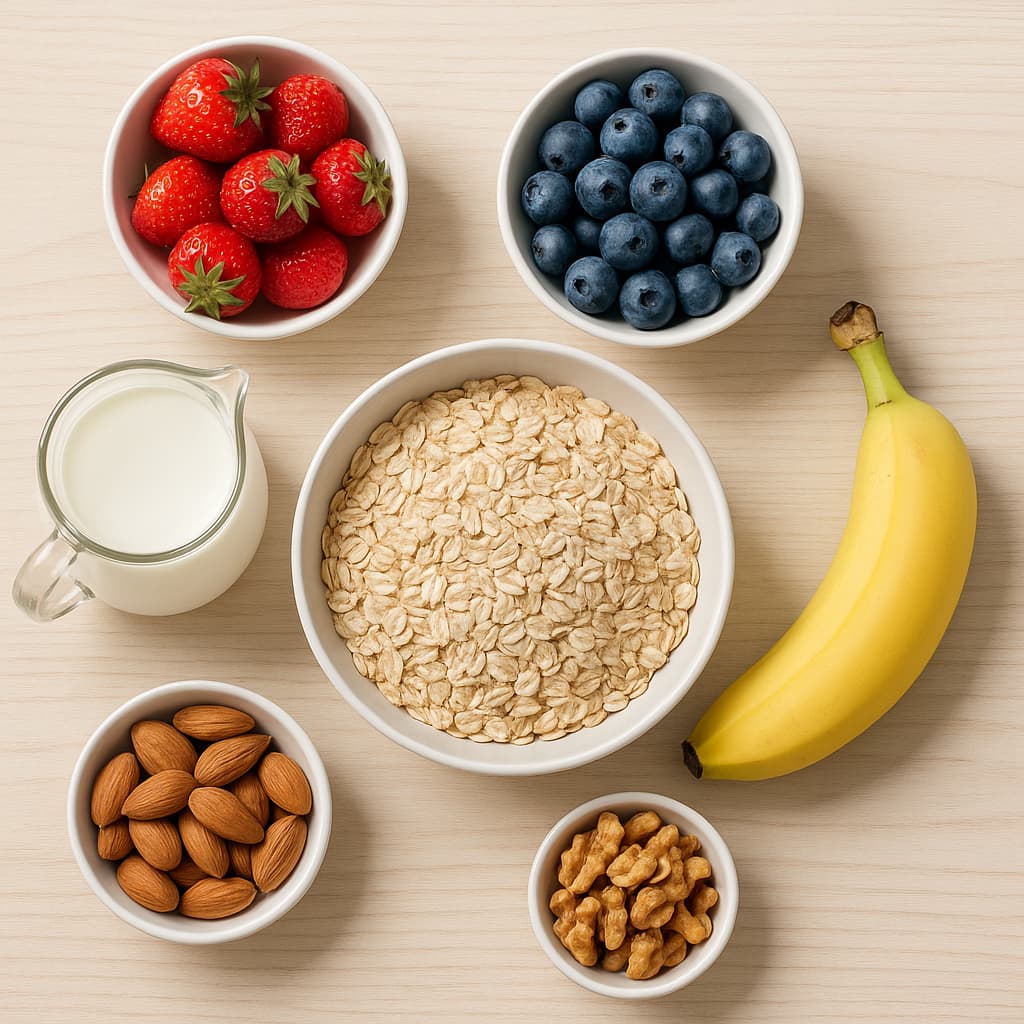
To maximize oatmeal’s health benefits, choose whole-grain, minimally processed oats such as steel-cut or rolled oats. These varieties retain more fiber and nutrients compared to instant or flavored options, which often contain added sugar and sodium.
Preparation Tips for Maximum Nutrition:
- Use water or milk: Cook oats with water for a lighter meal, or with low-fat milk or fortified plant-based milk for extra calcium and protein.
- Add nutrient-rich toppings: Enhance flavor and nutritional value with fresh fruits (berries, banana, apple), nuts, seeds (chia, flax, pumpkin), or a spoon of Greek yogurt.
- Avoid added sugar: Replace refined sugar with natural sweeteners like mashed fruit, cinnamon, or a small drizzle of honey.
- Boost protein: Add eggs, whey protein, or nut butter to promote fullness and muscle repair.
- Mind your portion: A typical serving is about ½ cup (40–50 g) dry oats, yielding ~1 cup cooked. This provides balanced energy and fiber without excess calories.
Storage Tip:
Store dry oats in an airtight container in a cool, dark place at or below 25°C (77°F). Once cooked, refrigerate leftovers within 2 hours and consume within 3–4 days for safety and freshness.
Possible Side Effects and Precautions
Oatmeal is widely considered safe and nutritious for most individuals. However, a few precautions can help ensure comfort, safety, and optimal health outcomes — especially for those with sensitivities or dietary restrictions.
Gluten Sensitivity:
While oats are naturally gluten-free, cross-contamination can occur during harvesting, transportation, or processing if oats come into contact with wheat, barley, or rye. Individuals with celiac disease or gluten intolerance should only purchase certified gluten-free oats, clearly labeled as processed in dedicated facilities. These certified options help reduce the risk of exposure to trace gluten.
Digestive Discomfort:
Oatmeal’s high fiber content may cause mild bloating, gas, or fullness when added to the diet too quickly — particularly for individuals not accustomed to high-fiber foods. To minimize discomfort, increase fiber intake gradually and drink plenty of water (at least 6–8 cups per day) to support healthy digestion and bowel regularity.
Allergic Reactions (Rare):
True oat allergies are uncommon but can occur. Symptoms may include skin irritation (such as itching or rashes), digestive upset, or mild respiratory reactions. Anyone experiencing these effects after consuming oats should discontinue use and seek advice from a healthcare professional.
For more information on safe allergen labeling and food-handling standards, refer to the U.S. Food and Drug Administration (FDA) – Food Allergen Labeling and Consumer Protection Act of 2004 (FALCPA). This law provides clear guidance on how allergens must be disclosed and labeled to help consumers make informed and safe food choices.
Frequently Asked Questions (FAQs)
Q1. Can I eat oatmeal every day?
Yes. Eating oatmeal daily is safe and beneficial for most people. It provides essential fiber, vitamins, and minerals that support digestion, heart health, and energy balance.
Q2. Is oatmeal good for weight loss?
Yes. The beta-glucan fiber in oats promotes fullness and helps control appetite, which may assist in maintaining a healthy weight when combined with balanced eating habits.
Q3. Does oatmeal contain gluten?
Pure oats are naturally gluten-free, but they can be contaminated during processing. Always look for certified gluten-free labels if you’re sensitive to gluten.
Q4. Is oatmeal safe for diabetics?
Yes. Oatmeal’s soluble fiber may help regulate blood sugar levels and improve insulin sensitivity. However, avoid flavored or sugary varieties to prevent glucose spikes.
Q5. What’s the healthiest way to prepare oatmeal?
Cook plain steel-cut or rolled oats with water or milk and top with fruits, nuts, or seeds for added nutrition. Avoid artificial sweeteners or processed toppings.
Q6. Can oatmeal improve digestion?
Yes. Its soluble and insoluble fibers help maintain bowel regularity and support beneficial gut bacteria, which promotes overall digestive comfort.
Q7. Is oatmeal safe for children and older adults?
Yes. It’s a soft, nutrient-rich food that’s easy to digest and provides sustained energy — ideal for all age groups when prepared with wholesome ingredients.
Conclusion
Oatmeal stands out as one of the most versatile and nutritious whole grains available. It’s rich in beta-glucan fiber, antioxidants, and essential minerals that support heart, gut, and metabolic health. Regularly including oatmeal in your diet may help maintain steady energy, promote satiety, and contribute to long-term wellness.
For best results, choose minimally processed oats, pair them with nutrient-dense toppings, and enjoy them as part of a balanced, whole-food diet.
This content is for informational purposes only and not medical advice.
